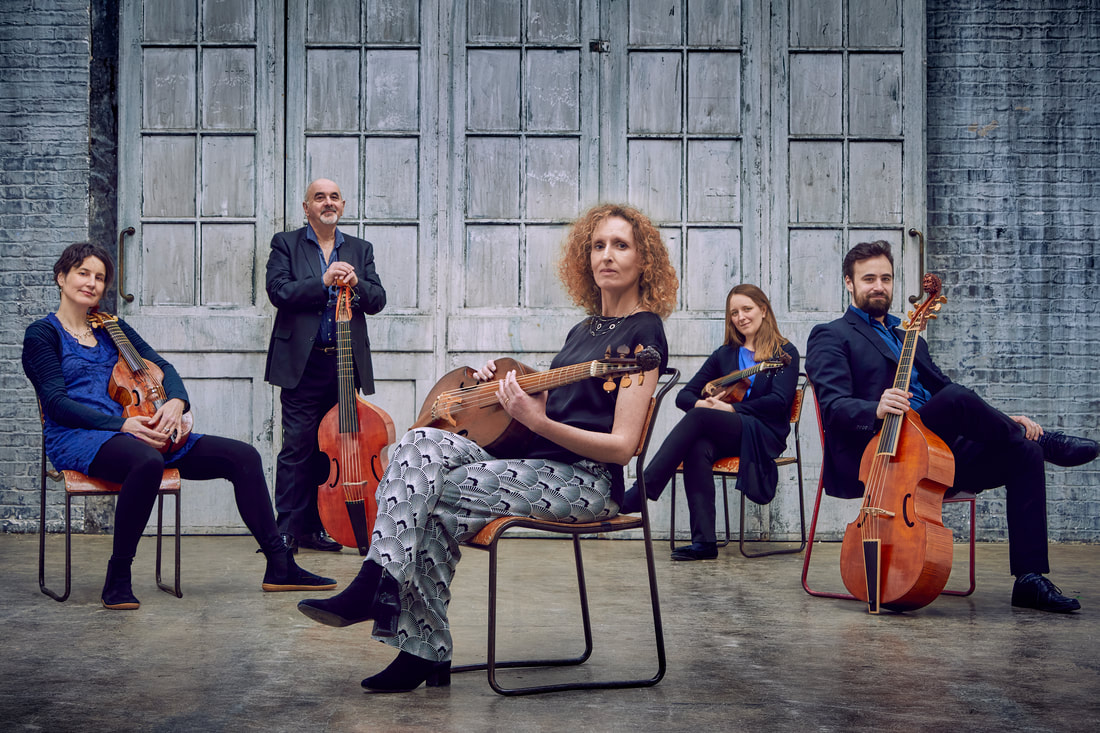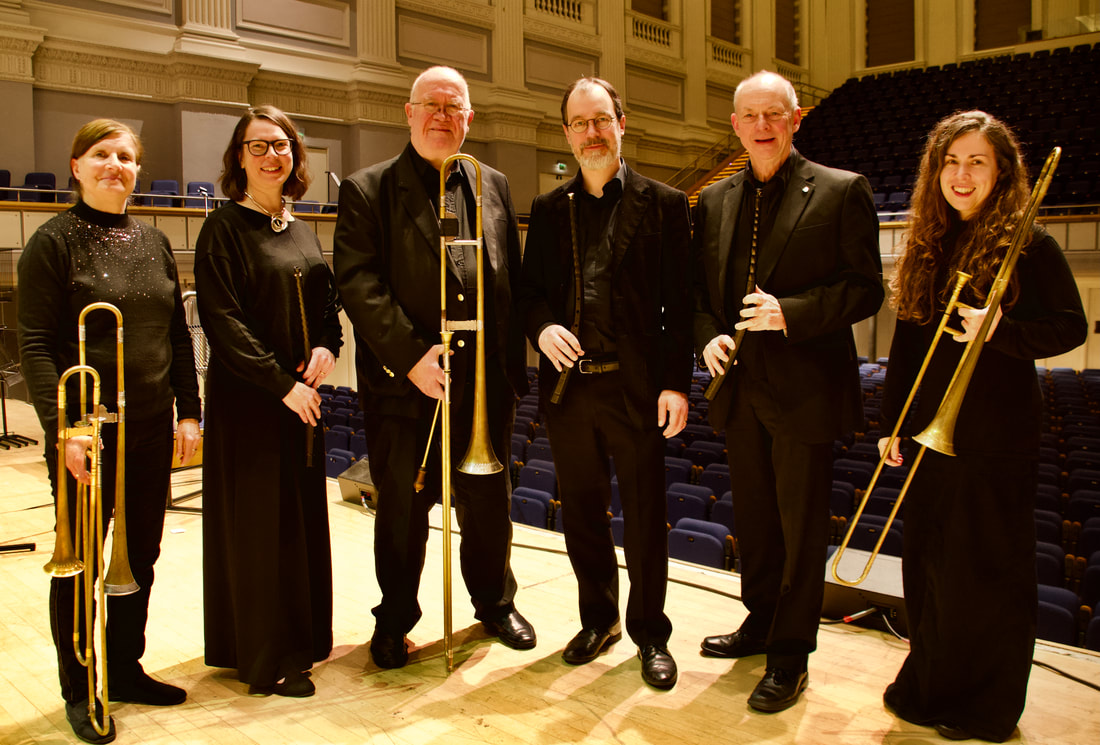
FRETWORK
"Fretwork is the finest viol consort on the planet" - Stephen Pettitt, The London Evening Standard.
Fretwork has been around for nearly 40 years, performing music old and new, and look forward to a challenging and exciting future as the world's leading consort of viols. Few other ensembles can match the range of Fretwork’s repertory. They have expanded it to include music from over 500 years, from the first printed consort music in Venice in 1501 to music written this year. And, in between, everything that can be played on a consort of viols - Byrd & Schubert, Purcell & Shostakovitch, Gibbons & Britten, Dowland & Grieg.
While they used to fly all over the globe, they have now committed to reducing their carbon footprint by travelling in Europe only by train or electric cars — recently, they have toured Germany, France, Spain, Austria & Slovenia in their two Teslas. The future sees many exciting projects based on the thrill of juxtaposition: making the experience of old music new and bringing the sensibilities of past ages to bear on contemporary music.
"Fretwork is the finest viol consort on the planet" - Stephen Pettitt, The London Evening Standard.
Fretwork has been around for nearly 40 years, performing music old and new, and look forward to a challenging and exciting future as the world's leading consort of viols. Few other ensembles can match the range of Fretwork’s repertory. They have expanded it to include music from over 500 years, from the first printed consort music in Venice in 1501 to music written this year. And, in between, everything that can be played on a consort of viols - Byrd & Schubert, Purcell & Shostakovitch, Gibbons & Britten, Dowland & Grieg.
While they used to fly all over the globe, they have now committed to reducing their carbon footprint by travelling in Europe only by train or electric cars — recently, they have toured Germany, France, Spain, Austria & Slovenia in their two Teslas. The future sees many exciting projects based on the thrill of juxtaposition: making the experience of old music new and bringing the sensibilities of past ages to bear on contemporary music.

His Majestys Sagbutts & Cornetts
Celebrating its 40th anniversary season in 2022-23, His Majestys Sagbutts & Cornetts continues in the same spirit as always: aiming to bring the sound of its noble instruments to the 21st century, through pan-European repertoire from 16th- and 17th-century composers, attracting new audiences via recordings, radio, television and (best of the lot!) live performance. The group’s illustrious-sounding name is taken from Matthew Locke’s “Five-part things for His Majestys Sagbutts and Cornetts” that were probably played during the coronation celebrations for King Charles II in 1661. Essentially a recital group comprising three cornetts, three sackbuts and keyboard continuo, HMSC often joins with singers and string players, and is frequently asked to take part in projects with choirs. Recent collaborations include work with Fretwork Viols and the Magdalena Consort, Dunedin Consort, Alamire, Magnificat, the Choir of King’s College, Cambridge, and Ex Cathedra. Individual members of HMSC teach at conservatoires and universities throughout the UK and Europe and the group is often invited to give masterclasses and workshops as a part of its educational work.
Activities over the group’s forty-year history have been diverse, ranging from sound and vision recordings for the BBC comedy The Two Ronnies, to appearances in the Salzburg Festival, St. Mark’s, Venice, Sydney Opera House and at the BBC Proms in the Royal Albert Hall. HMSC has more than thirty recordings to its credit, including several critically acclaimed discs of Venetian instrumental music from the turn of the 17th century by Giovanni Gabrieli, Giovanni Battista Grillo, and Gioseffo Guami. In addition to rediscovering the forgotten repertories of the past, expanding the contemporary repertoire for cornetts and sackbuts is an increasingly important part of the group’s mission and legacy. HMSC has enjoyed a particularly fruitful relationship with composer Martyn Harry, whose extended suite At His Majestys Pleasure, a 65-minute ‘opera without words’, was commissioned for the group’s 30th anniversary in 2012. In addition to recording the music on CD, HMSC has since performed selections from the work in recitals in Spain, Germany, the USA, and on numerous occasions in the UK, culminating in the first full performance of the suite (rescored for an enlarged ensemble) at the Oxford Early Music Festival in February 2020. HMSC has also recorded the music of Timothy Roberts (a former keyboardist with the group), On the Wall, Off the Wall: Six Venetian Sketches for cornetts and sackbuts (2004) on a CD for Toccata Classics (2022). And, in celebration of the group’s 40th anniversary, His Majestys is proud to have commissioned a new work, Accolade, by Howard Skempton. With support from the Vaughan Williams Foundation, Accolade will have its first performances in Oxford and Innsbruck this year.
Celebrating its 40th anniversary season in 2022-23, His Majestys Sagbutts & Cornetts continues in the same spirit as always: aiming to bring the sound of its noble instruments to the 21st century, through pan-European repertoire from 16th- and 17th-century composers, attracting new audiences via recordings, radio, television and (best of the lot!) live performance. The group’s illustrious-sounding name is taken from Matthew Locke’s “Five-part things for His Majestys Sagbutts and Cornetts” that were probably played during the coronation celebrations for King Charles II in 1661. Essentially a recital group comprising three cornetts, three sackbuts and keyboard continuo, HMSC often joins with singers and string players, and is frequently asked to take part in projects with choirs. Recent collaborations include work with Fretwork Viols and the Magdalena Consort, Dunedin Consort, Alamire, Magnificat, the Choir of King’s College, Cambridge, and Ex Cathedra. Individual members of HMSC teach at conservatoires and universities throughout the UK and Europe and the group is often invited to give masterclasses and workshops as a part of its educational work.
Activities over the group’s forty-year history have been diverse, ranging from sound and vision recordings for the BBC comedy The Two Ronnies, to appearances in the Salzburg Festival, St. Mark’s, Venice, Sydney Opera House and at the BBC Proms in the Royal Albert Hall. HMSC has more than thirty recordings to its credit, including several critically acclaimed discs of Venetian instrumental music from the turn of the 17th century by Giovanni Gabrieli, Giovanni Battista Grillo, and Gioseffo Guami. In addition to rediscovering the forgotten repertories of the past, expanding the contemporary repertoire for cornetts and sackbuts is an increasingly important part of the group’s mission and legacy. HMSC has enjoyed a particularly fruitful relationship with composer Martyn Harry, whose extended suite At His Majestys Pleasure, a 65-minute ‘opera without words’, was commissioned for the group’s 30th anniversary in 2012. In addition to recording the music on CD, HMSC has since performed selections from the work in recitals in Spain, Germany, the USA, and on numerous occasions in the UK, culminating in the first full performance of the suite (rescored for an enlarged ensemble) at the Oxford Early Music Festival in February 2020. HMSC has also recorded the music of Timothy Roberts (a former keyboardist with the group), On the Wall, Off the Wall: Six Venetian Sketches for cornetts and sackbuts (2004) on a CD for Toccata Classics (2022). And, in celebration of the group’s 40th anniversary, His Majestys is proud to have commissioned a new work, Accolade, by Howard Skempton. With support from the Vaughan Williams Foundation, Accolade will have its first performances in Oxford and Innsbruck this year.

Silas Wollston (organ)
Recognised as a leading early music specialist, Silas Wollston has combined performance and scholarship in a varied career. A longstanding member of the English Baroque Soloists and The Bach Players, he performs on harpsichord and organ with early music orchestras and ensembles, as well as in duo partnerships and as a soloist. He recently joined the London Handel Players and the ensemble In Echo. A former chorister, he studied the organ with John Scott before taking up an organ scholarship at Trinity College, Cambridge. He then went on to study harpsichord and early piano at the Guildhall School of Music and Drama and the Conservatoire Royale in Brussels.
Beyond his career a performer on keyboard instruments, Silas also has much experience as a choral director and an academic lecturer. As Director of Music at Queens’ College, Cambridge, between 2011and 2015, he greatly enhanced the profile and reputation of the choir, issuing recordings with Orchid Classics. He is now part of the choral directing team at the Royal School of Church Music. He has lectured in fugue and stylistic composition at Cambridge University and is a council member of the Handel Institute. His research interests include 17th-century violin-band music, especially the music of Matthew Locke, and Handel's compositional process.
Recognised as a leading early music specialist, Silas Wollston has combined performance and scholarship in a varied career. A longstanding member of the English Baroque Soloists and The Bach Players, he performs on harpsichord and organ with early music orchestras and ensembles, as well as in duo partnerships and as a soloist. He recently joined the London Handel Players and the ensemble In Echo. A former chorister, he studied the organ with John Scott before taking up an organ scholarship at Trinity College, Cambridge. He then went on to study harpsichord and early piano at the Guildhall School of Music and Drama and the Conservatoire Royale in Brussels.
Beyond his career a performer on keyboard instruments, Silas also has much experience as a choral director and an academic lecturer. As Director of Music at Queens’ College, Cambridge, between 2011and 2015, he greatly enhanced the profile and reputation of the choir, issuing recordings with Orchid Classics. He is now part of the choral directing team at the Royal School of Church Music. He has lectured in fugue and stylistic composition at Cambridge University and is a council member of the Handel Institute. His research interests include 17th-century violin-band music, especially the music of Matthew Locke, and Handel's compositional process.